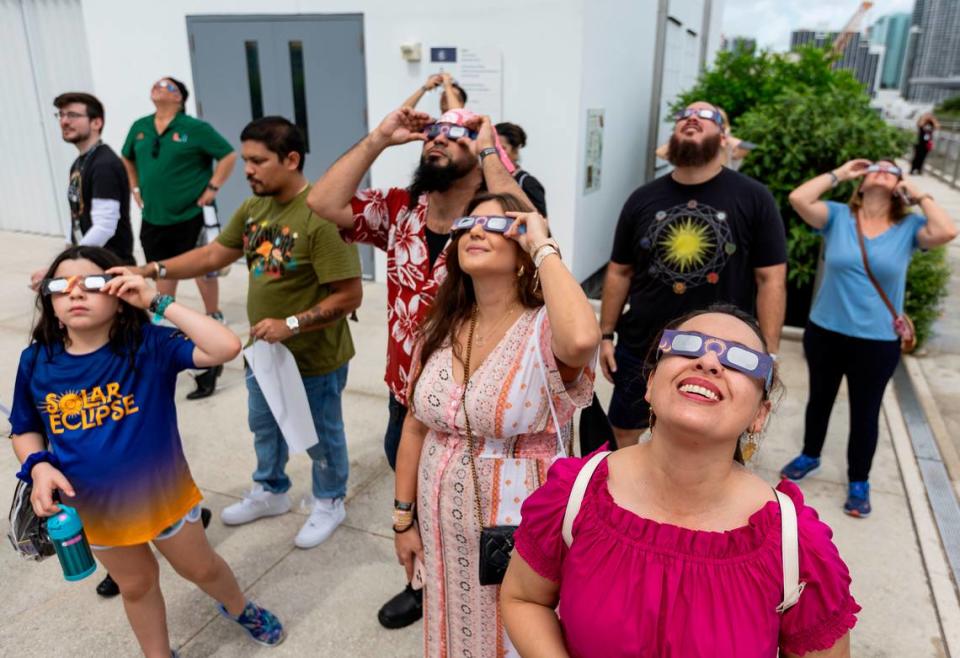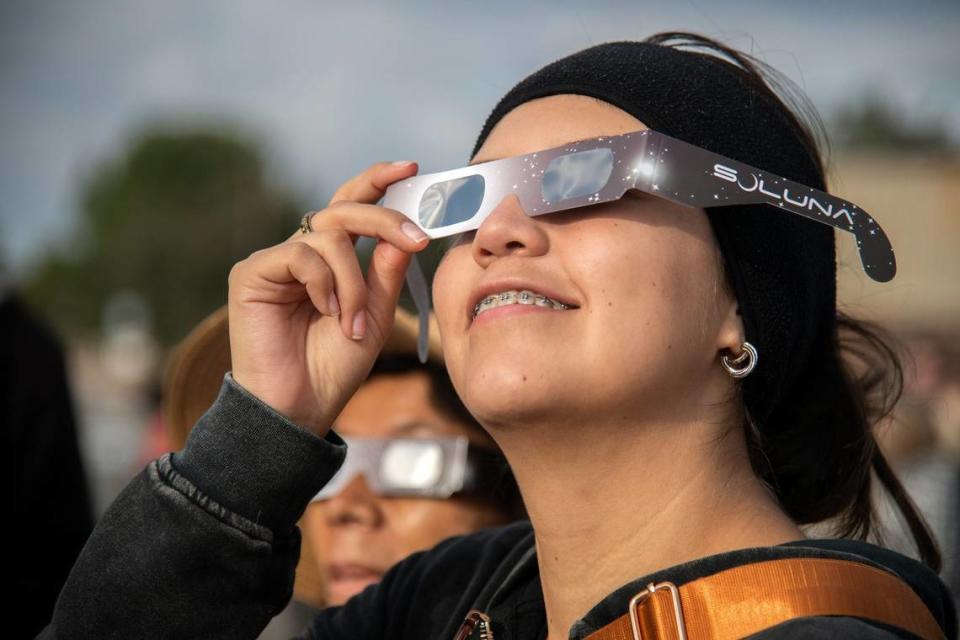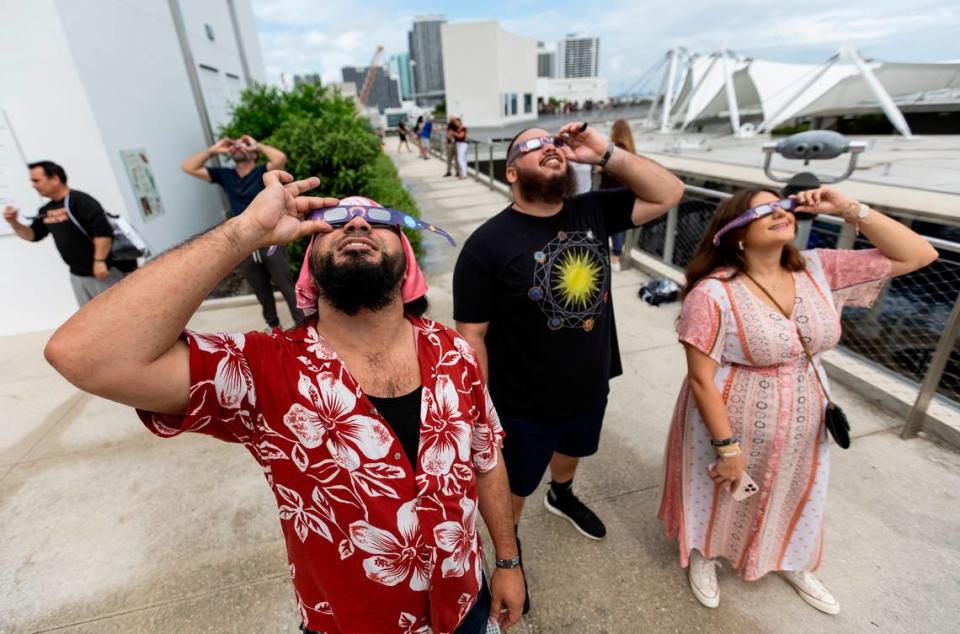When is the best time to watch the solar eclipse in Miami and Florida? Take a look
Who took a bite out of the sun?
That’s a question some may ask soon, when the moon is expected to pass before the sun, dimming the skies for a couple of hours.
When is the solar eclipse in Miami and other Florida cities? How can you safely look at it? Where can you buy eclipse glasses? What’s the weather forecast for Monday?
Here’s what to know.
What is a solar eclipse?
A solar eclipse happens when, at just the right moment, the moon passes between the sun and Earth, NASA says.
When the moon blocks only part of the sun’s light, it’s called a partial solar eclipse. But when the moon blocks all of the sun’s light, it’s a total solar eclipse.
Note: In Florida, we will experience a partial solar eclipse, with about 46% of the sun’s light blocked during its peak.
At what time is the solar eclipse in Florida?
For Miami, the celestial show begins around 1:47 p.m. Monday and ends at 4:13 p.m., with the peak occurring at 3:01 p.m., according to the University of Miami.
Here are the peak times for other Florida cities:
▪ Panama City: 1:57 p.m. (CT)
▪ Cape Coral: 2:59 p.m.
▪ Naples: 2:59 p.m.
▪ Tampa: 3 p.m.
▪ Tallahassee: 3 p.m.
▪ Fort Lauderdale: 3:02 p.m.
▪ Orlando: 3:03 p.m.
▪ Gainesville: 3:03 p.m.
▪ Port St. Lucie: 3:03 p.m.
▪ West Palm Beach: 3:03 p.m.
▪ Jacksonville: 3:05 p.m.
If you want more information about the eclipse, including when it will start and end in your area, enter your city or coordinates using the U.S. Naval Observatory’s tool. You can also find local information about the eclipse by entering your ZIP Code in NASA’s Eclipse Explorer.

How can I safely look at the solar eclipse?
It’s not safe to look directly at the sun without special eye protection for solar viewing, according to NASA.
“Viewing any part of the bright sun through a camera lens, binoculars, or a telescope without a special-purpose solar filter secured over the front of the optics will instantly cause severe eye injury,” NASA says.
When watching the eclipse, you must look through safe solar viewing glasses or a handheld solar viewer at all times.
“Eclipse glasses are NOT regular sunglasses; regular sunglasses, no matter how dark, are not safe for viewing the sun,” NASA says.
Recording the eclipse without a filter could also damage your camera. NASA also has tips on how to photograph a solar eclipse with your cellphone.
Where can I buy eclipse glasses?

You may still have time to buy eclipse glasses, but inventory is running low or depleted in some stores. While some offer delivery at a hefty price, there are free pickup options.
When ordering solar eclipse glasses online, be sure that both the vendor and the manufacturer are included on the American Astronomical Society’s list of approved glasses sellers and makers, Consumer Reports recommends.
“Some sites are selling counterfeit eclipse glasses that may not protect your eyes,” Consumer Reports says.
For that reason, AAS does not recommend you buy eclipse glasses via Amazon, e-Bay, Temu, or any other online marketplace. All eclipse glasses must meet the safety requirements of the ISO 12312-2 international standard.
Here are some options:
▪ Lowe’s
▪ Walmart (kit includes camera filter)
▪ Target
▪ Frost Science’s Science Store
Are there eclipse viewing events in Miami?

If you are looking for an eclipse viewing event in Miami, we know of at least one.
Phillip & Patricia Frost Museum of Science, 1101 Biscayne Blvd., is hosting an event Monday starting at 10:30 a.m. You’ll learn about eclipses and safely watch the solar eclipse.
Every ticket holder will be given a free pair of eclipse glasses.
Museum rooftop access (Level 6) will be limited to active Frost Science members only, and available on a first-come, first-served basis, weather permitting.
Non-member tickets are $37.95 each.
What’s Miami’s weather forecast?
There is mostly good news on the weather front for people in the Miami area.
Monday morning is forecast to be sunny, followed by temperature peaks in the high-70s to lower-80s, according to the National Weather Service in Miami.
But weather service meteorologist Barry Baxter told the Miami Herald that clouds may block the eclipse for some. Rain is not expected.
“It’s going to be a partly cloudy day,” he said.
Are you looking to increase your chances of having an unobstructed view of the eclipse?
Baxter says South Florida’s west coast, including the Naples area, will have clearer skies.
“The farther west you go toward the Gulf Coast side, the more sunny it will be,” he said.
When will Florida see an eclipse again?
There will be a partial eclipse on Jan 26, 2028, but in Florida, the sun will only be partially obscured up to about 16% depending on your location, NASA’s heliophysics editorial lead Abbey Interrante told the Herald.

